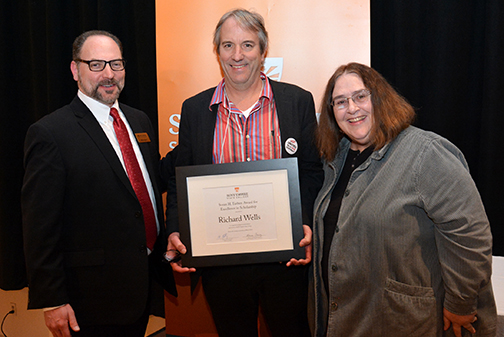March 27, 2018
Susan H. Turben Award Excellence in Scholarship Goes to Richard Wells

(SARATOGA SPRINGS, N.Y. – March 22, 2018) Richard Wells, an associate professor at the Harry Van Arsdale Jr. Center for Labor Studies, SUNY Empire State College, received the Empire State College Foundation Susan H. Turben Award for Excellence in Scholarship at All College 2018. He is described by colleagues as a prodigious scholar and a public intellectual with particular areas of interest – labor and class, race and gender, income inequality in New York City, and labor and higher education. He exemplifies the “powerful tradition at Empire State College of promoting the scholarship of teaching and learning,” wrote his colleague Peggy Tally, who nominated him for the award. “Dr. Wells demonstrates the best of Empire State College in terms of his life as a scholar, a practitioner and an individual whose research and scholarship is able to transform the lives of the students he works with at the Harry Van Arsdale Jr. Center for Labor Studies,” she said.
“I congratulate Dr. Wells for winning this prestigious award,” said Vice President for Advancement Walter Williams, “and for focusing on scholarship as well as teaching, which is one of the hallmarks of SUNY Empire. Just as important is our commitment to give personal attention to all students, which is why we call our faculty mentors. Because of his contribution to the study of labor, class and gender, Dr. Wells richly deserves this award.”
“It is great to be recognized by the college with this award, both individually and in terms of how it highlights the important work of the The Harry Van Arsdale Jr. Center for Labor Studies,” Wells said.
Wells earned his Ph.D. in anthropology at The New School for Social Research (now the New School University); a master’s degree in Near Eastern Studies and Journalism from New York University, and his master’s in anthropology from the graduate faculty of the New School for Social Research. Tally wrote, “The interdisciplinary orientation at the New School allowed him to grow both as a social scientist, as well as a historian and cultural studies scholar, and to develop a strong background in labor history, as well as economics and philosophy.”
He has presented at 14 regional and international conferences and contributed widely to labor journals and journals for a general audience, like The American Prospect. One of his timely articles was, “The Labor of Reality TV: The Case of ‘The Deadliest Catch” published in Labor: Studies of Working Class History of the Americas. In it, he confronts the show’s valorization of the labor and masculinist ethos of the working-class fisherman who are portrayed as heroes, and has students who have watched the series at his request begin to question their assumptions of gender and labor in a changing workforce.
About the Susan H. Turben Award for Excellence in Scholarship
The Susan H. Turben Award for Excellence in Scholarship recognizes and honors a faculty member or professional employee for distinguished scholarly activity that is widely recognized and that significantly enhances the academic reputation of Empire State College.
About SUNY Empire State College
Empire State College, the nontraditional, open college of the SUNY system, educates nearly 18,000 students worldwide at eight international sites, more than 30 locations in the state of New York, online, as well as face to face and through a blend of both, at the associate, bachelor’s and master’s degree levels.
The average age of an undergraduate student at the college is 35, and graduate students’ average age is 40.
Most Empire State College students are working adults. Many are raising families and meeting civic commitments in the communities where they live, while studying part time.
In addition to awarding credit for prior college-level learning, the college pairs each undergraduate student with a faculty mentor who supports that student throughout his or her college career.
Working with their mentors, students design an individual degree program and engage in guided independent study and course work onsite, online or through a combination of both, which provides the flexibility for students to choose where, when and how to learn.
The college’s 78,000 alumni are active in their communities as entrepreneurs, politicians, business professionals, artists, nonprofit agency employees, teachers, veterans and active military, union members and more.
The college was first established in 1971 by the SUNY Board of Trustees with the encouragement of the late Ernest L. Boyer, chancellor of the SUNY system from 1970 to 1977.
Boyer also served as United States commissioner of education during the administration of President Jimmy Carter, and then as president of the Carnegie Foundation for the Advancement of Teaching.
More information about the college is available at www.esc.edu.